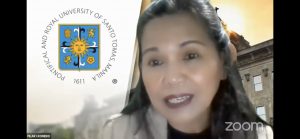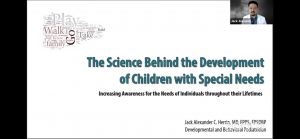The UST College of Education addressed the need for inclusivity in education during its webinar “Inclusionem 2021: Strengthening the Home-School Partnership and Education of Children with Special Needs in the New Normal” held on October 1, 2021.



In her opening remarks, Education Dean Assoc. Prof. Pilar I. Romero, Ph.D., pointed out that progress cannot be characterized as only economic or political. “We see moral progress in the shift of our mindsets. Consequently, that also brought about the shift in our attitudes. We have progressed in our understanding of what it means to be human. We now reject superiority based on ethnicity, faith, tradition, and socio-economic status,” she said.
Developmental Pediatrician Dr. Jack Alexander C. Herrin, explained that the United Nations Convention on the Rights of the Child and Sustainable Development Goals ensure inclusive and equitable quality education.
There are different factors that could affect each individual’s ability to develop. Some get sick, undergo trauma, and have difficulties at birth. It is important to recognize the early onset of autism spectrum disorder (ASD), attention deficit hyperactivity disorder (ADHD), and other developmental disabilities.
According to Herrin, a developmental pediatrician at the Cardinal Santos Medical Center and St. Luke’s Medical Center BGC, “The goals of management include setting a system of rules, meeting with the school, talking about interventions, maybe having a formal IQ test or psychoeducational assessment, and recognizing limitations.”
The doctor also cautioned that some children may fall into anxiety and depression as they grow older.
“This is not a developmental disorder per se, but I think all children have mental health concerns and mental health needs which we need to deal with on a daily basis, especially those who are a little order,” he said.
Meanwhile, Ajo Unified School in Arizona, USA Special Education Director Ms. Marichou T. Beltran, discussed the possible challenges encountered by exceptional learners during quarantine in a virtual or digital classroom.
“Learners are confronted with lack of teacher-student-parent coordination, being unable to socialize, no computer and internet access, and the inability to adapt to distance education,” she said. Educators must find ways on how to enhance skills and integrate technology in teaching.
Beltran explained that “if you are a special education teacher, you have to consider the eligibility or the exceptionality. For example, kids with autism have their own way of learning as compared to kids with ADHD.”
Organized in partnership with the UST SIMBAHAYAN Community Development Office, the webinar was part of a series in celebration of National Teachers’ Month.




